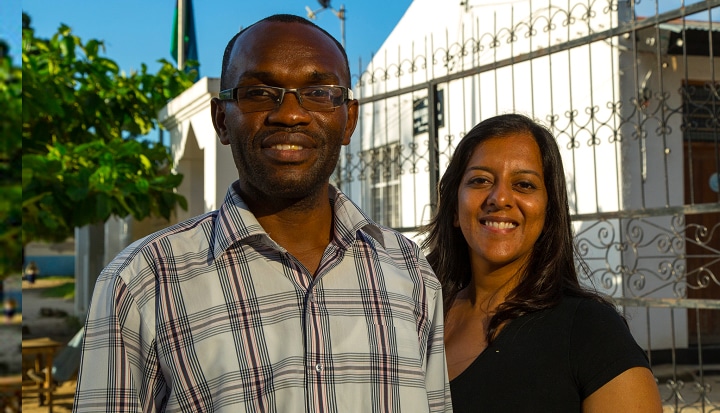Photo Credit*: Tim Maynard/VSO
July 7th 2014: Public debate on the role of the private sector in poverty alleviation is longstanding, but there is no doubt that the lines between the private, public and non-profit sectors are becoming more blurred. Recently, Gib Bulloch, Executive Director of Accenture Development Partnerships, blogged on the Huffington Post about the significant (and interrelated) changes in development and business that we are currently witnessing under the banner of a ‘fourth sector’, and I can’t help but agree that a shift is in progress. This shift is characterised by the business imperative to engage in sustainable and green growth at the macro level giving rise to the need for companies to work closely with non-profit organisations at the micro level so they can guarantee successful delivery and inclusivity. But cooperation inevitably brings challenges as well as benefits to both sides. For example, it is a big ‘ask ‘for the fast-paced corporate world to handle the slower speed required to measure development impact and consult communities diligently. Dealing with this sort of natural “jet lag”, in which the corporate partner sometimes needs some quicker wins to keep people on side internally, whilst the NGO is working to a different timescale, is something I experience daily.
VSO’s approach to working with corporations
VSO embraces working across all sectors, including private and corporate. Our private sector/corporate engagement work is focussed on two main areas: programme-led partnerships and corporate volunteering.
Programme-led partnerships recognise that companies are ‘development actors’ not in a philanthropic sense, but through taking steps to adopt or increase pro-poor business practices and innovations to create inclusive business models.
VSO is fast becoming a leader in skills-based corporate volunteering, uniquely placed to harness the expertise and experience of the private sector to support development programmes.
Bringing our programme-led partnerships together with corporate volunteering offers exciting and unique possibilities. People who are responsible for key areas of business, such as directors of supply chains, procurement and product development get the chance to work closely with the communities that they rely on, like farmers producing commodities that end up on our supermarket shelves.
We go much further than ‘show and tell’ photo opportunities. We build programmes that support these corporate volunteers to work alongside communities, mutually building capacity through knowledge transfer. VSO then supports employees to become ‘intrapreneurs’; people who take their overseas experiences and insight back into their work when they return to the office, in a way that benefits the interests of the poor and the marginalised.
What does it look like on the ground?
I’m seeing lots of companies expressing an interest in the work VSO is doing to secure livelihoods in the developing world and emerging markets in particular. The programme in Ghana in partnership with Mondelēz has thrown up some fantastic results for the community, especially for women cocoa farmers who are part of this. The 5-year Making Markets Work success with Accenture has resulted in some great innovation in markets for people like dairy and fish farmers in Malawi and Nigeria, and is being expanded in a second phase due to start this month.
On the corporate volunteering side, VSO is marking 10 years in partnership with HR service provider Randstad, through which 150 of their staff have been placed overseas in the past with tremendous value to both sides. We are also piloting a programme with Barclays, which is exploring the benefits of international volunteering as part of its leadership development programme.
All this comes down to knowing what we’re good at and focusing on it. NGOs know what they’re good at, we know our skills and expertise but being able to talk about how we can benefit a business is very important and a work in progress.
Some lessons learnt
- The benefits to NGOs of working in partnership with the corporate sector transcend the receipt of funds.
- NGOs need to keep breaking down traditional roles and forge new partnerships between donor partners, government, civil society AND the private sector.
- Both parties need to be realistic about diverging interests, accept and recognise these and not be too naïve in our expectations.
- Corporate partnerships can have a huge impact on shifting attitudes, like on gender. Simple things like a male volunteer helping to fetch water or a female volunteer chairing meetings and leading on projects can help to gradually shift attitudes. Women professionals from the corporate sector can have a double impact if they volunteer: sharing their professional skills with local counterparts and acting as role models for women’s empowerment.
- To have sustained impact, businesses must factor women’s empowerment into their partnership work with development organisations.
- Finally, engaging employees in sustainability programmes and supply chains through volunteering can be a great way to inspire intrapreneurs
Question: How do you think businesses can inspire a new generation of intrapreneurs to support their business play its part in the fight against poverty?
*Photo Caption:
Anuradha Banerjee (female) and Ali Baker (male) the Focal Lead from the Department of Energy in Tanzania. They are working together to examine employment opportnities and other issues in Zanzibar. UK VSO volunteer Anuradha Banerjee is one of two Barclays employees placed through a VSO-Barclays partnership. Based in Zanzibar, Tanzania, her 5 month role, which comes to an end in July 2014, is to support VSO’s small and medium enterprise strategy and identify ways entrepreneurs and the private sector can maximise on opportunities from recent oil and gas investments in the country.










